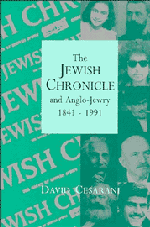Book contents
- Frontmatter
- Contents
- Preface
- Acknowledgements
- Introduction
- 1 Origins and pioneers, 1841–1855
- 2 Defining an identity: the Jewish Chronicle and mid-Victorian Anglo-Jewry, 1855–1878
- 3 The era of Asher Myers and Israel Davis, 1878–1906
- 4 The hegemony of Leopold Greenberg, 1907–1931
- 5 Discordant interlude: J. M. Rich and Mortimer Epstein, 1932–1936
- 6 Ivan Greenberg and the crisis years, 1937–1946
- 7 The post-war era: J. M. Shaftesley and David Kessler, 1946–1958
- 8 The Jewish Chronicle under William Frankel, 1958–1977
- 9 The Jewish press in a divided community: Geoffrey Paul, 1977–1990
- Conclusion
- Notes
- Bibliography
- Index
- Plate section
3 - The era of Asher Myers and Israel Davis, 1878–1906
Published online by Cambridge University Press: 22 September 2009
- Frontmatter
- Contents
- Preface
- Acknowledgements
- Introduction
- 1 Origins and pioneers, 1841–1855
- 2 Defining an identity: the Jewish Chronicle and mid-Victorian Anglo-Jewry, 1855–1878
- 3 The era of Asher Myers and Israel Davis, 1878–1906
- 4 The hegemony of Leopold Greenberg, 1907–1931
- 5 Discordant interlude: J. M. Rich and Mortimer Epstein, 1932–1936
- 6 Ivan Greenberg and the crisis years, 1937–1946
- 7 The post-war era: J. M. Shaftesley and David Kessler, 1946–1958
- 8 The Jewish Chronicle under William Frankel, 1958–1977
- 9 The Jewish press in a divided community: Geoffrey Paul, 1977–1990
- Conclusion
- Notes
- Bibliography
- Index
- Plate section
Summary
Asher Myers, the Russian Crisis and the immigration debate
In his will Benisch left the Jewish Chronicle to the Anglo-Jewish Association which he had helped to found. However, the new owners had no desire to run a newspaper and quickly looked for a buyer. It was subsequently acquired by Israel Davis (1847–1927), a barrister, and Sydney Montagu Samuel (1848–84), a wealthy scion of the Samuel Montagu family, who combined business in the City with an active interest in the world of letters. Benisch also stipulated that Asher Myers should be made the ‘manager’ of the paper. Davis and Montagu accordingly appointed Myers editor and made him a partner even though he contributed no capital to the purchase.
The son of a synagogue official and bookseller, Asher Myers (1848–1902) had received a private education followed by commercial training in Moses, Son and Davis, wholesale clothiers. In 1868 he was involved in the publication of the Jewish Record, although his participation ceased after twelve months and he seems to have lost the money he had invested in it. For six months in 1870, he was employed as the principal officer of the Board of Guardians, a position which gave him a valuable insight into the workings of Jewish philanthropy. He eventually joined the staff of the Jewish Chronicle with responsibility for its business affairs, although his duties broadened after Benisch returned to the editorial chair.
- Type
- Chapter
- Information
- The Jewish Chronicle and Anglo-Jewry, 1841–1991 , pp. 67 - 102Publisher: Cambridge University PressPrint publication year: 1994



